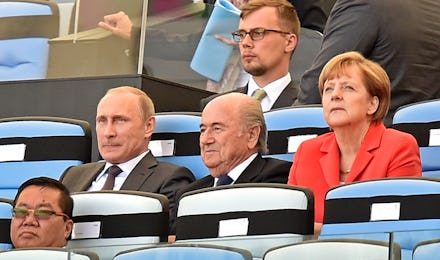There's One Unusual Way the World Could Send a Message to Putin Over Malaysia Airlines Crash

By the time Russia hosts the 2018 World Cup, it will have spent untold billions to build nine new stadiums (and upgrade three others) at a time when the country's economy is stagnating and its poverty rate is above 10 percent, according to 2012 figures.
Similar reasons were used to justify protests in the lead-up to this year's World Cup in Brazil. But at least the Brazilian government wasn't linked to supplying rebels with a weapon that was used to blow a passenger aircraft out of the sky, killing all 298 aboard. At least Brazil didn't encourage the destabilization of a sovereign country. Or enact an anti-gay law last year.
No, those things are all Russia's doing, which have resulted in uproar in internationally, but Europeans have been hesitant to do much of anything to stop it.
Recently, though, some German politicians have raised an intriguing possibility: Get soccer's governing body, FIFA, to move the World Cup from Russia to another European nation that already has the infrastructure in place to hold the matches. Four years is plenty of time.
"If [Russian President Vladimir] Putin doesn't actively cooperate on clearing up the plane crash, the soccer World Cup in Russia in 2018 is unimaginable,” German parliamentarian Peter Beuth said.
Already the Dutch and English federations have pooh-poohed the plan, calling it premature. FIFA said Friday it remains committed to keeping the World Cup in Russia. Still, it deserves serious consideration.
Despite the protests of human rights advocates, Putin already had his moment in the sporting spotlight this past winter when Sochi held the Winter Olympics.
In terms of both audience and geographic scope (games will be held in 11 cities), the World Cup is bigger than the Olympics. As such, the 2018 tournament would be a further legitimization of Putin's rule — one that could be most aptly described as a dictatorship. Such practices cannot be ignored.
On the other hand, this is FIFA we're talking about. The Russian oligarchs played no small role in footing the bill for Sochi and FIFA is never one to shy away from money. The oligarchs may not spend efficiently (or altruistically), but there's no doubt that the next World Cup stadiums and fan zones will be extravagantly luminous.
No, in four years' time there'll be another pop star in the middle of a huge Russian arena, singing about peace and unity. Another team will walk up the stadium stairs, shake hands with Putin, receive a winners' medal and hoist up the World Cup trophy in celebration. This whole controversy will have been forgotten, and so too will the word MH17.